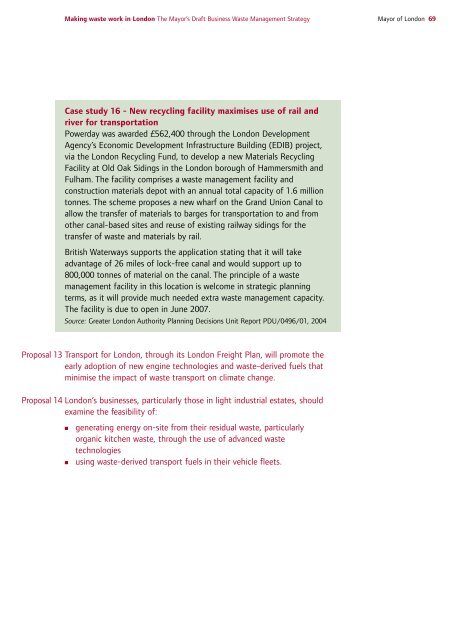Draft Business Waste Strategy PDF - london.gov.uk - Greater ...
Draft Business Waste Strategy PDF - london.gov.uk - Greater ...
Draft Business Waste Strategy PDF - london.gov.uk - Greater ...
You also want an ePaper? Increase the reach of your titles
YUMPU automatically turns print PDFs into web optimized ePapers that Google loves.
Making waste work in London The Mayor’s <strong>Draft</strong> <strong>Business</strong> <strong>Waste</strong> Management <strong>Strategy</strong> Mayor of London 69<br />
Case study 16 - New recycling facility maximises use of rail and<br />
river for transportation<br />
Powerday was awarded £562,400 through the London Development<br />
Agency’s Economic Development Infrastructure Building (EDIB) project,<br />
via the London Recycling Fund, to develop a new Materials Recycling<br />
Facility at Old Oak Sidings in the London borough of Hammersmith and<br />
Fulham. The facility comprises a waste management facility and<br />
construction materials depot with an annual total capacity of 1.6 million<br />
tonnes. The scheme proposes a new wharf on the Grand Union Canal to<br />
allow the transfer of materials to barges for transportation to and from<br />
other canal-based sites and reuse of existing railway sidings for the<br />
transfer of waste and materials by rail.<br />
British Waterways supports the application stating that it will take<br />
advantage of 26 miles of lock-free canal and would support up to<br />
800,000 tonnes of material on the canal. The principle of a waste<br />
management facility in this location is welcome in strategic planning<br />
terms, as it will provide much needed extra waste management capacity.<br />
The facility is due to open in June 2007.<br />
Source: <strong>Greater</strong> London Authority Planning Decisions Unit Report PDU/0496/01, 2004<br />
Proposal 13 Transport for London, through its London Freight Plan, will promote the<br />
early adoption of new engine technologies and waste-derived fuels that<br />
minimise the impact of waste transport on climate change.<br />
Proposal 14 London’s businesses, particularly those in light industrial estates, should<br />
examine the feasibility of:<br />
■ generating energy on-site from their residual waste, particularly<br />
organic kitchen waste, through the use of advanced waste<br />
technologies<br />
■ using waste-derived transport fuels in their vehicle fleets.
















